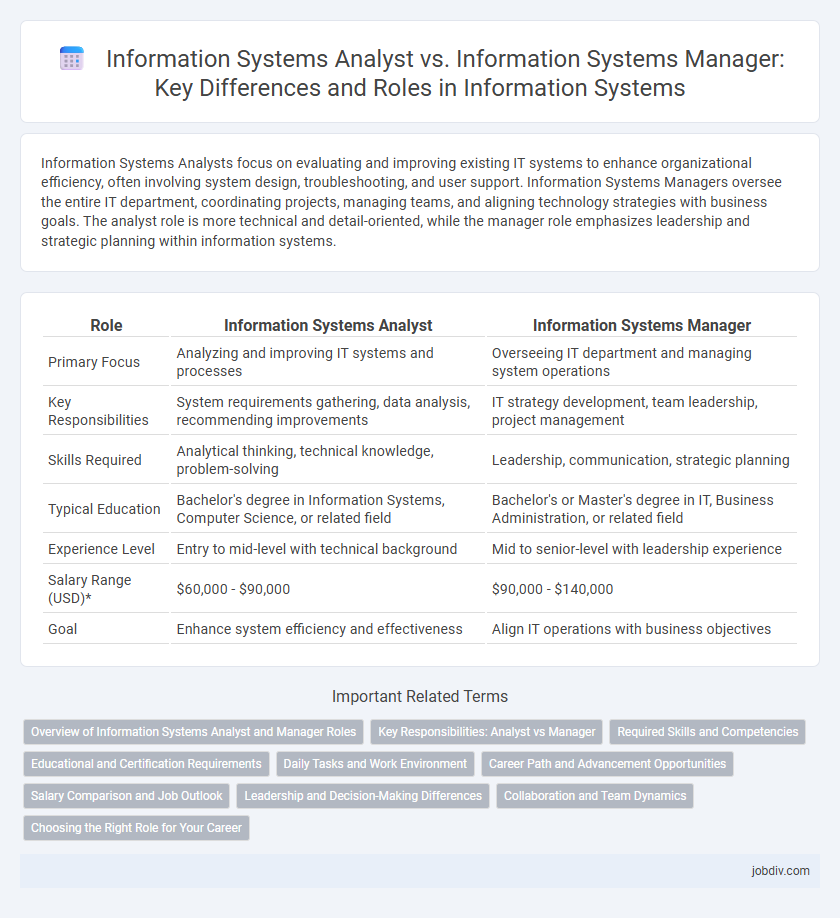Information Systems Analysts focus on evaluating and improving existing IT systems to enhance organizational efficiency, often involving system design, troubleshooting, and user support. Information Systems Managers oversee the entire IT department, coordinating projects, managing teams, and aligning technology strategies with business goals. The analyst role is more technical and detail-oriented, while the manager role emphasizes leadership and strategic planning within information systems.
Table of Comparison
| Role | Information Systems Analyst | Information Systems Manager |
|---|---|---|
| Primary Focus | Analyzing and improving IT systems and processes | Overseeing IT department and managing system operations |
| Key Responsibilities | System requirements gathering, data analysis, recommending improvements | IT strategy development, team leadership, project management |
| Skills Required | Analytical thinking, technical knowledge, problem-solving | Leadership, communication, strategic planning |
| Typical Education | Bachelor's degree in Information Systems, Computer Science, or related field | Bachelor's or Master's degree in IT, Business Administration, or related field |
| Experience Level | Entry to mid-level with technical background | Mid to senior-level with leadership experience |
| Salary Range (USD)* | $60,000 - $90,000 | $90,000 - $140,000 |
| Goal | Enhance system efficiency and effectiveness | Align IT operations with business objectives |
Overview of Information Systems Analyst and Manager Roles
Information Systems Analysts evaluate and improve computer systems to optimize business processes, focusing on analyzing user requirements and designing solutions. Information Systems Managers oversee IT departments, coordinate projects, and ensure systems align with organizational goals and security standards. Analysts concentrate on technical problem-solving and system design, while Managers handle strategy, team leadership, and resource allocation.
Key Responsibilities: Analyst vs Manager
Information Systems Analysts primarily focus on analyzing system requirements, designing solutions, and troubleshooting technical issues to improve organizational IT efficiency. Information Systems Managers oversee the implementation and maintenance of IT systems, manage teams, and align technology strategies with business objectives. Analysts emphasize detailed system evaluation and optimization, while managers concentrate on leadership, project coordination, and strategic planning within information systems.
Required Skills and Competencies
Information Systems Analysts require strong analytical skills, proficiency in system evaluation, and expertise in data modeling and workflow optimization to design and improve IT solutions. Information Systems Managers must demonstrate leadership abilities, strategic planning, and project management skills to oversee IT infrastructure, coordinate teams, and align technology initiatives with business goals. Both roles demand a deep understanding of information technology, problem-solving capabilities, and effective communication to ensure successful system implementation and operation.
Educational and Certification Requirements
Information Systems Analysts typically require a bachelor's degree in computer science, information technology, or a related field, with certifications such as CompTIA Security+ or Certified Business Analysis Professional (CBAP) enhancing their qualifications. Information Systems Managers often hold a bachelor's degree complemented by advanced certifications like Certified Information Systems Security Professional (CISSP) or Project Management Professional (PMP), reflecting their leadership role. Both positions benefit from ongoing education in emerging technologies and cybersecurity to maintain industry relevance.
Daily Tasks and Work Environment
Information Systems Analysts focus on analyzing, designing, and improving IT systems to meet organizational needs by gathering requirements, troubleshooting issues, and coordinating with developers and users in a collaborative office or remote setting. Information Systems Managers oversee IT teams, plan and implement technology strategies, manage budgets, and ensure system security and performance, typically working in dynamic corporate environments with frequent interaction across departments. Both roles require strong problem-solving skills, but managers have broader leadership responsibilities while analysts concentrate on technical system optimization.
Career Path and Advancement Opportunities
Information Systems Analysts typically begin their careers by assessing and improving IT systems to enhance organizational efficiency, often progressing to senior analyst or project manager roles through developing technical expertise and business acumen. Information Systems Managers oversee IT teams and strategic planning, advancing into executive positions such as Chief Information Officer (CIO) or IT Director by leveraging leadership skills and comprehensive knowledge of technology management. Career advancement opportunities for analysts usually involve specialization or management, while managers focus on broadening organizational impact and driving digital transformation.
Salary Comparison and Job Outlook
Information Systems Managers typically earn higher salaries than Information Systems Analysts, with median annual wages around $159,000 compared to $93,000 respectively, according to the U.S. Bureau of Labor Statistics. Job outlook for Information Systems Managers is projected to grow 11% from 2022 to 2032, while Information Systems Analysts are expected to grow at a faster rate of 25% over the same period. Demand for both roles is driven by the increasing reliance on data analytics and cybersecurity in organizations across various industries.
Leadership and Decision-Making Differences
Information Systems Managers lead teams and strategize technology initiatives, making high-level decisions that align IT goals with business objectives. Information Systems Analysts focus on analyzing system requirements, optimizing processes, and providing data-driven recommendations to support managerial decisions. Leadership in management roles emphasizes directing resources and guiding projects, while analysts prioritize problem-solving and technical evaluation to influence decision-making.
Collaboration and Team Dynamics
Information Systems Analysts facilitate collaboration by translating technical requirements into actionable insights, enabling cross-functional teams to align on project goals and enhance system performance. Information Systems Managers drive team dynamics by overseeing development processes, managing resources, and fostering communication channels that optimize productivity and innovation within IT departments. Strong collaboration between analysts and managers ensures seamless integration of business needs and technological solutions, boosting organizational efficiency.
Choosing the Right Role for Your Career
Information Systems Analysts specialize in evaluating and improving IT systems, leveraging technical skills and data analysis to optimize organizational processes, making them ideal for professionals who enjoy problem-solving and hands-on technology work. Information Systems Managers oversee IT teams and strategic planning, focusing on leadership, budgeting, and aligning IT initiatives with business goals, suited for those seeking managerial responsibilities and decision-making roles. Choosing between these roles depends on whether you prefer direct system analysis and technical tasks or broader organizational leadership and strategic management.
Information Systems Analyst vs Information Systems Manager Infographic

 jobdiv.com
jobdiv.com